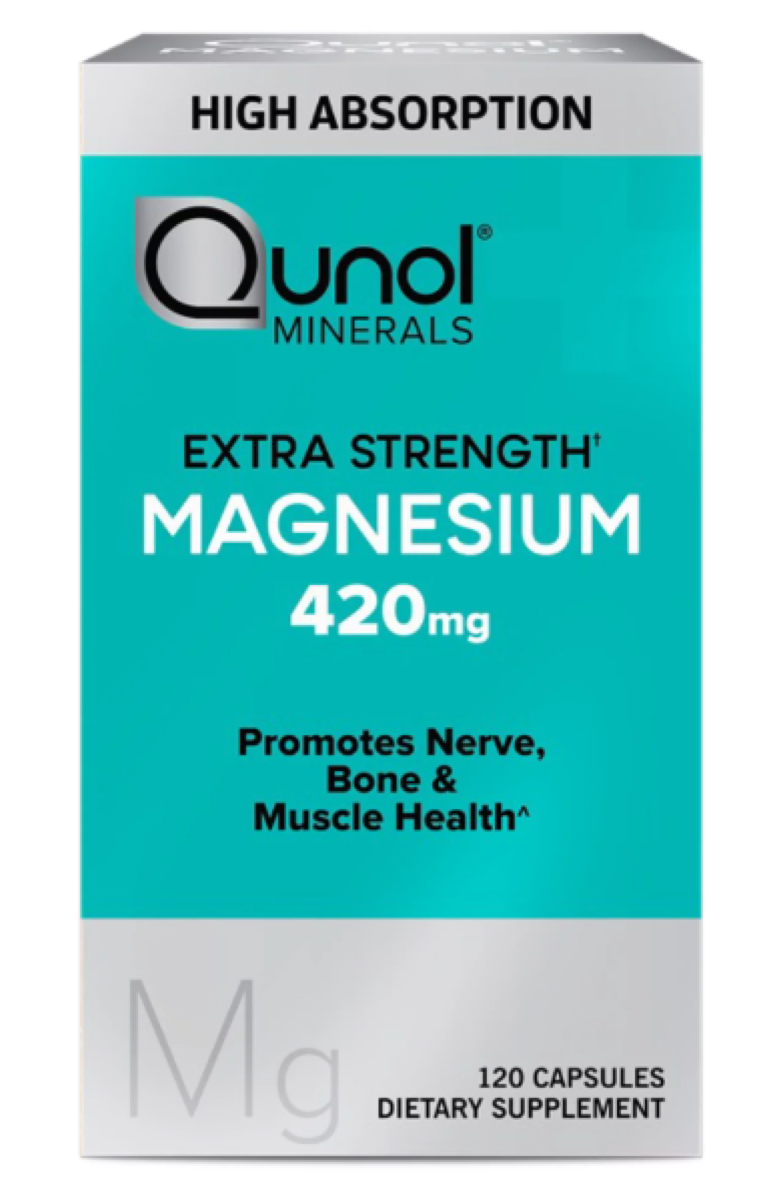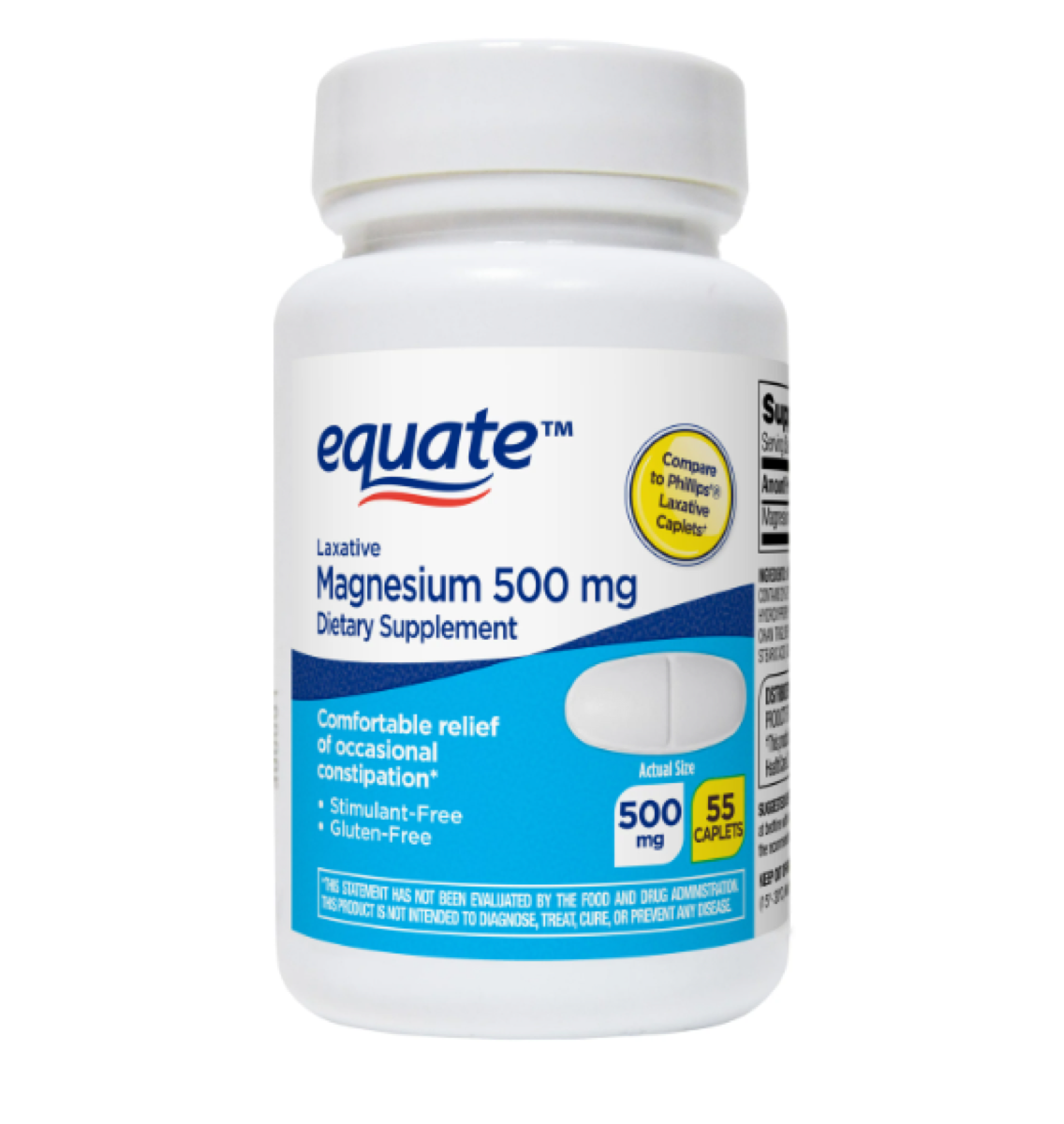Many of us take daily supplements with our morning cup of coffee or tea. Your doctor may recommend vitamin D for fatigue or depression, probiotics for gut health, or a basic multivitamin for overall wellness. These supplements are conveniently available over the counter, meaning you can pick them up without a prescription from your local pharmacy or grocery store. But if you get your vitamins from Walmart, you should be aware that the retailer is currently under investigation for some of the supplements it sells, namely Qunol Magnesium and Equate Magnesium. Read on to find out why these two products are facing scrutiny.
READ THIS NEXT: Walmart Is Under Fire After a Report Alleged High Levels of Arsenic and Lead in Its Spices.

According to the Mayo Clinic, magnesium plays an integral role in your body, supporting both muscle and nerve function and energy production. We get magnesium from our diet, with foods like nuts, seeds, whole grains, beans, leafy veggies, milk, and yogurt among those that are richest in this mineral. If you’re not getting enough through your diet, your doctor can help you determine if you need to add a supplement and identify those that are best absorbed in the body, according to the National Institutes of Health (NIH).
But some people add magnesium supplements on their own, due to marketing strategies that present it as a “super-pill,” Harvard Health Publishing points out. However, while some claim that magnesium can assist with things like fatigue, muscle tension, or insomnia, experts say that there isn’t enough definitive evidence to support these claims—which is why a few supplements are being questioned.

Attorneys working for Top Class Actions are looking into potential mislabeling of Qunol Extra Strength Magnesium and magnesium sold under Walmart’s Equate brand, which is used for its generic health and beauty products. According to these attorneys, both products might not “live up to their claims.”ae0fcc31ae342fd3a1346ebb1f342fcb
The Qunol-branded magnesium has packaging that states it is “specifically formulated to provide a nutritional boost to your nerve, bone & muscle health.” But Top Class Actions takes issue with some wording on the back label, which reads, “These statements have not been evaluated by the Food and Drug Administration [FDA]. This product is not intended to diagnose, treat, cure, or prevent any disease.” The note is also included under “Warnings” on the Walmart product page.
Top Class Actions points out that Qunol touts these products as having “high absorption” and “extra strength,” setting it apart from other magnesium products. Qunol Magnesium is not sold exclusively at Walmart—the products are also available for purchase on Qunol’s website, at CVS, and via other “food, drug, mass and club retailers,” the company’s FAQ page states.
Top Class Actions also notes that mineral supplements like Qunol aren’t regulated by the FDA. According to the FDA’s website, the agency “does not approve dietary supplements or their labeling,” except for “health claims” that require premarket review and authorization.
RELATED: For more up-to-date information, sign up for our daily newsletter.

Walmart’s Equate Magnesium is a bit different, as it’s a dietary supplement meant to be used as a laxative. Attorneys for Top Class Actions say this product might also be mislabeled, as it states that the magnesium caplets provide “comfortable relief of occasional constipation.”
This bottle has the same disclaimer as the Qunol magnesium, noting that it hasn’t been evaluated by the FDA and “is not intended to diagnose, treat, cure, or prevent any disease.”
Best Life reached out to both Walmart and Qunol for comment, but has yet to hear back.

Top Class Actions points to statements made by Noorhan Nassar, MD, primary care doctor at Houston Methodist, who claims that it’s fairly uncommon to be deficient in magnesium and that the wellness benefits might not be all that accurate.
“From an anecdotal standpoint, people will certainly tell you that magnesium supplements work,” Nassar said in a post for Houston Methodist. “But the actual data supporting benefits of supplementation in otherwise healthy adults isn’t complete—results are mixed and the design of these studies isn’t always ideal.”
While the benefits of supplementation aren’t entirely clear, experts say it’s not necessarily unsafe. But the Mayo Clinic warns that you shouldn’t take too many magnesium supplements, as this can cause nausea, abdominal cramps, and diarrhea. Supplements can also interfere with antibiotics and medication, making it doubly important to consult your doctor. Mayo Clinic notes that healthy adults don’t need to worry about getting too much magnesium from food.
If you purchased either the Qunol Magnesium or Equate Magnesium and they didn’t work as you expected them to, you can fill out a form to join the class action lawsuit investigation. Top Class Action notes that in doing so, you might be contacted by an attorney or law firm to discuss your experience.